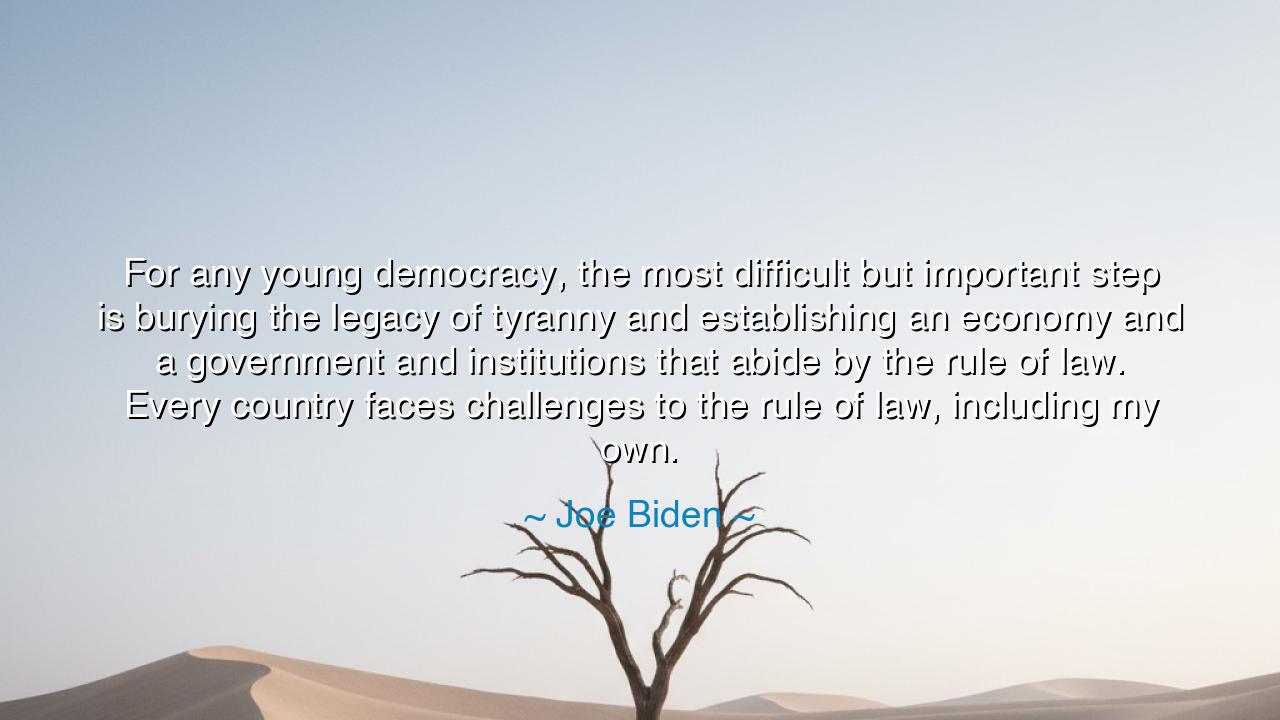
For any young democracy, the most difficult but important step is
For any young democracy, the most difficult but important step is burying the legacy of tyranny and establishing an economy and a government and institutions that abide by the rule of law. Every country faces challenges to the rule of law, including my own.






"For any young democracy, the most difficult but important step is burying the legacy of tyranny and establishing an economy and a government and institutions that abide by the rule of law. Every country faces challenges to the rule of law, including my own." – Joe Biden
In these solemn and farsighted words, Joe Biden, the 46th President of the United States, speaks as both a statesman and a student of history. His words remind us that freedom is never born whole—it must be forged, tested, and purified through time. Every nation that rises from the shadow of tyranny must confront not only the ruins of its past but also the habits of mind that oppression leaves behind. The struggle to build a just society is not only the construction of laws and institutions; it is the transformation of the human spirit—from submission to courage, from fear to responsibility, from the rule of men to the rule of law.
The origin of this quote lies in Biden’s long-standing belief in democracy as a living, evolving promise. Spoken in the context of America’s support for nations transitioning from dictatorship to democracy, his words are steeped in empathy born of experience. Biden has often acknowledged that even the oldest democracies must wrestle with the corruption of power and the fragility of justice. Thus, his message is universal: the rule of law is not a gift bestowed by history—it is a constant labor, renewed by every generation that chooses truth over tyranny and justice over expedience.
To understand the depth of Biden’s insight, one must look to the great transformations of the modern age. After the fall of Nazi Germany, for example, the Allied nations faced the monumental task of rebuilding not just a nation, but a moral order. The Nuremberg Trials, the drafting of a new constitution, and the establishment of a democratic government in West Germany were not merely political acts—they were moral ones. They sought to bury the legacy of tyranny, to replace the culture of fear and blind obedience with a culture of law and accountability. Yet even in victory, this process was fraught with pain, for the ghosts of dictatorship linger long in the hearts of men.
The same pattern repeated itself decades later, when nations across Eastern Europe emerged from the iron grip of Soviet control. Poland, Hungary, and the Czech Republic, though eager for freedom, soon discovered that liberty is not sustained by emotion alone—it must be rooted in institutions that command respect, not fear. They had to learn, as Biden suggests, that democracy is not a single event but a discipline; it is the long, patient task of building systems where power is limited, corruption is punished, and citizens believe that justice belongs to all, not the few. The rule of law is thus the invisible pillar upon which every true democracy stands.
Biden’s reflection also carries humility, for he admits that even his own country—the United States—faces its own trials in upholding this principle. Every democracy, no matter how established, is tempted by the lure of partisanship, the manipulation of truth, and the erosion of trust in institutions. The strength of the law lies not in the perfection of those who write it, but in the willingness of a people to defend it even when it is inconvenient, even when it restrains their own side. This acknowledgment transforms Biden’s statement from a lecture into a confession—a reminder that the battle for integrity never ends.
There is, within his words, an echo of ancient wisdom. For even the philosophers of old—Aristotle, Cicero, Confucius—taught that justice is the foundation of a lasting civilization. A society that forgets this truth courts destruction, for when law becomes a tool of power rather than a shield of fairness, the spirit of tyranny is reborn in new forms. Biden’s call, then, is not merely political—it is moral. To “bury the legacy of tyranny” is to cleanse the soul of a nation, to renounce the arrogance that power breeds, and to build anew upon the rock of justice.
The lesson, then, is timeless: democracy is not secured by victory, but by vigilance. The rule of law is not self-sustaining—it depends on the courage of individuals who refuse to let truth be twisted, who demand transparency, and who treat justice as sacred. The fall of tyrants is but the beginning; the harder task is teaching freedom to endure in the hearts of those who once obeyed out of fear.
And so, the practical actions are these: defend the rule of law, even when it restrains those you favor. Demand accountability from leaders, even those you love. Support institutions that protect the weak and challenge the powerful. For the work of freedom is never finished, and as Joe Biden reminds us, every democracy—young or old—must constantly bury the remnants of tyranny to keep alive the light of liberty.






AAdministratorAdministrator
Welcome, honored guests. Please leave a comment, we will respond soon